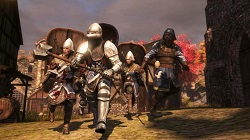 The background is Judges 19; the story of a Levite traveling with his concubine (a servant-wife) and a male servant. They arrived in Gibeah by nightfall. An elderly citizen invited the Levite to bring them and stay the night in his house with him and his daughter.
The background is Judges 19; the story of a Levite traveling with his concubine (a servant-wife) and a male servant. They arrived in Gibeah by nightfall. An elderly citizen invited the Levite to bring them and stay the night in his house with him and his daughter.
The men of the city were homosexual and came to the house in search of the Levite intending to engage in sexual relationships with him. The old man pleaded with them to not bother the Levite. He instead gave the men his daughter and the concubine, whom they raped and the concubine died during the night.
The next morning the Levite found her lifeless body lying outside the door. For whatever reasons (there is no Theological explanation), he dismembered her body into 12 pieces and took a piece to each of the 12 tribes: Reuben, Simeon, Judah, Issachar, Zebulun, Benjamin, Dan, Naphtali, Gad, Asher, Ephraim, and Manasseh. His objective was to incite them to invade Gibeah and exact the punishment of death on the men. All of the tribes agreed except one, the tribe of Benjamin.
Gibeah was owned by Benjamin, which would rather go to war than to allow the attack. Thus, it was the onset of a war between Benjamin with 26,000 soldiers (plus Gibeah’s 700 that were marksmen with slingshots) and the 426,000 that comprised the army of the 11 tribes.
Looking at the war in hindsight, there are two paradoxical battles. The first is in Judges 20:18: “Then the children of Israel arose and went up to the house of God to inquire of God. They said, “Which of us shall go up first to battle against the children of Benjamin?” The Lord said, Judah first!”
Even though the Lord said to send Judah first, the 11 tribes lost the battle. Note Judges 20:21, “Then the children of Benjamin came out of Gibeah, and on that day cut down to the ground twenty-two thousand men of the Israelites.”
The first seemingly paradox is that God, whose word cannot return to Him void, sent the 11 tribes into a battle with Judah going first but they were defeated. (This scenario invalidates the notion that sending Judah [the praisers] first insures victory.) In vs. 23, after the 11 tribes sought counsel of the Lord the second time, He again sent them into battle and again they were defeated; the second paradox.
Now let’s look at what brought the victory the third time the 11 tribes went before the Lord in vs. 26-28:
- Then all the children of Israel, that is, all the people, went up and came to the house of God and wept. They sat there before the Lord and fasted that day until evening; and they offered burnt offerings and peace offerings before the Lord.
- So the children of Israel inquired of the Lord (the ark of the covenant of God was there in those days,
- and Phinehas the son of Eleazar, the son of Aaron, stood before it in those days), saying, “Shall I yet again go out to battle against the children of my brother Benjamin, or shall I cease?” And the Lord said, “Go up, for tomorrow I will deliver them into your hand.”
We know that weeping before the Lord is indicative of a contrite heart and fasting demonstrates humility. The offering of burnt offerings were done both in the morning and evening. But, the peace offerings was eye-catching and raised the question as to whether it attributed to the 11 tribes winning the third battle.
Note that in vs. 26 that burnt offerings preceded peace offerings. It’s because that in Exodus 29:38-42, Leviticus 6:9-13, and Numbers 28:1-8 burnt offerings were daily occurrences. However, given that the peace offering is not noted in the references it was not a daily requirement.
Given that the Hebrews wanted to petition God for help while they were engaged in battle as in Judges 20 above, then the peace offering was added to celebrate the fellowship the they enjoyed from serving God as prescribed by the Mosaic Law. Whereas, if the Hebrews wanted to express their thankfulness to God because of something miraculous that He did for them, then the peace offering became a thank offering.
Note the references from Leviticus 7 and Judges 20 in the NKJV and NIV respectively. Peace Offering in the NKJV is translated Fellowship Offering in the NIV, which indicates that they are synonymous. Also, note that the offerings can be by individual or for the masses. In Leviticus, the peace/fellowship offer is not in conjunction with the daily burnt offering whereas in Judges it is.
| Peace/Fellowship Offering Offered Individually And For The People | |
Leviticus 7:28-29 NKJV (Individually)
|
Leviticus 7:28-29 NIV (Individually)
|
Judges 20:26 NKJV (For The Masses)
|
Judges 20:26 NIV (For The Masses)
|
Such sacrifices were offered in a variety of settings by the ancient Israelites, and later by the Jewish priesthood, the priests at the Temple in Jerusalem. A korban was often an animal sacrifice, such as a sheep or a bull that underwent Jewish ritual slaughter, and was often cooked and eaten by the offerer, with parts given to the priests [to also be eaten] and the remaining parts burned on the Temple mizbe’ah. Sacrifices could also consist of doves, grain or meal, wine, or incense.
The Peace [Fellowship] Offering could be offered by an individual or for the masses. It compares to a Thanksgiving holiday dinner for which the host would invite family and friends and all would join in dining and fellowshipping around a table of specially prepared foods.
It has already been established that for a Peace/Fellowship Offering the breast of the sacrificial animal would be eaten by the priest and parts by the offerer. Instead of family and friends being invited to partake of a Peace/Fellowship Offering the priest would symbolically represent God. Thus, God would be honored through the priest by giving him the choicest portions of the animal: the breast and the right shoulder. The offerer would eat the remainder of the flesh (for two days; and what remains would be burned). Thus, the celebration of fellowship would be with God vicariously through the priest, hence, the Fellowship offering.
There were several types of burnt offering that the ancient Hebrews offered to God. But, there is a distinction given when the Peace/Fellowship Offering is offered as recorded in Exodus 20:24, “An altar of earth you shall make for Me, and you shall sacrifice on it your burnt offerings and your peace offerings, your sheep and your oxen. In every place where I record My name I will come to you, and I will bless you.”
Exodus 20:24 is the only verse in the Bible in which God mentions a burnt offering and a peace offering with His commitment to come to the people and bless. It could therefore be concluded that the peace offering insures God’s commitment to bring deliverance to the offerer(s).
The scenario in Judges is first instance where God honored burnt offerings that included the Peace Offering and delivered the Hebrews from a situation that they created because of being presumptuous. The other occasion is in 1 Chronicles 21:26-27. It came about because of King David presuming to take a census that God did not tell him to take. King David did took the census to approximate the strength of his army to determine if it was sufficient to win a battle, whereas, historically God repeatedly gave the Israelites the victory in battles wherein they were the minority.
King David made God angry. And, He subsequently released an angel to execute judgment against Israel. But, through King David’s humility and offering the Peace/Fellowship Offering with the burnt-offering, God stopped the angel. Note the reference:
- And David built there an altar to the Lord, and offered burnt offerings and peace offerings, and called on the Lord; and He answered him from heaven by fire on the altar of burnt offering.
- So the Lord commanded the angel, and he returned his sword to its sheath.
The point to be remembered is the modern day Christians coined phrase, “send Judah first”. But, note that the Hebrews were so presumptuous in their decisions to go to war that God told them to do it to their own hurt.
This is comparable to the Hebrews asking for a king and God telling them that He wanted to be their King. That would not satisfy them. They were unrelenting in wanting a king like other nations had. So, God gave them Saul to their own hurt.
The two scenarios prove that we must pray “if it be Your will” and not presume upon God’s goodness. Otherwise, there may be consequential troubles.
The Peace Offering is not mentioned in the New Testament. But, it is there and is infinitely more powerful than in the Old Testament. Please click on The Power Of Holy Communion. It’s The Law Of The Spirit.


